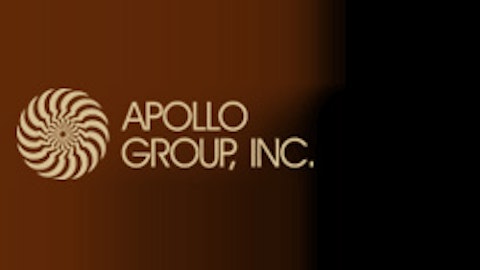Editor’s Note: Contrary to reporting in a prior version of this post, Ashford University retains its accreditation, and did not recently lose it. The Fool regrets the error.
The higher education landscape is changing, and for-profit education providers could wind up with a failing grade. With costs skyrocketing, and students turning to the fast-growing field of free online education services, let’s see whether these traditional education companies look set to pass or flunk.
Recently, a number of websites have popped up offering university level courses that are priced for perfection: They’re free! Massive open online courses (MOOCs) such as edX or Coursera let individuals seeking knowledge expand on what they already know, or learn something new, at no charge. KhanAcademy is another website which offers educational videos on a wide variety of topics, including finance, physics, and government.
Although some of these programs offer certificates of completion that can be added to a resume, they do not offer the accredited degree most employers look for. But the landscape is changing, and great alternative solutions have been brought forward, including knowledge and skills tests. These tests would allow individuals to study using these free online resources, then demonstrate their mastery of a subject in a way that could be useful for potential employers.
For example, the Bloomberg Aptitude Test (BAT) is a skill-based test offered by the Bloomberg Institute for individuals interested in finance or investment banking. If finance does not suit you, Smarterer offers skills tests for over 500 subjects, ranging from social media to computer programming.
More diplomas, bigger bills
Higher education is more prevalent today than ever before. This New York Times article and this census report show that, in 1940, only 5% of the American population had a bachelor’s degree. Today, that number is closer to 30%.
The percentage of those holding a graduate degree has also risen in the last decade, climbing from 8.7% to 10.9 %. But the percentage of individuals obtaining advanced degrees is not the only thing on the rise.
Since 1985, higher education tuition has grown 498%, compared to 114% for the Consumer Products Index.

Source: http://inflationdata.com/Inflation/Inflation_Articles/Education_Inflation.asp
The rise in tuition rates has drawn numerous companies into the for-profit education arena. Some have found success, while others have faced legal issues, low graduation rates, and falling enrollments. When it comes to education, grades are what set you apart.
How for-profit educators measure up
Bridgepoint Education Inc (NYSE:BPI) has already started to show cracks in its business. In October 2012, Bridgepoint announced that the Justice Department was investigating the company’s compensation practices for its admissions personnel. The company’s most popular school, Ashford University, was accused of spending more money to enroll new students than it did to teach them. Adding insult to injury, Ashford University was denied accreditation by the Western Association of Schools and Colleges in July 2012, although it remains accredited by the Higher Learning Commission. With its most popular school reapplying for accreditation at the Western Association of Schools and Colleges, Bridgepoint receives an “F”.




